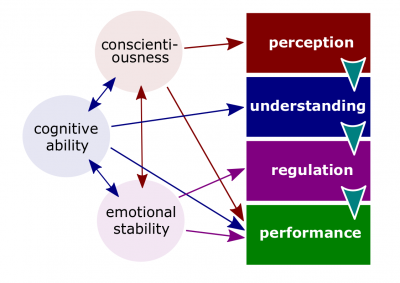Difference between revisions of "Emotional intelligence"
(Created page with "400px|thumb|right|[[Emotional intelligence]]Emotional intelligence (hereinafter, the ''Ability'') is the ability to detect and to manag...") |
|||
| (3 intermediate revisions by 2 users not shown) | |||
| Line 1: | Line 1: | ||
[[File:Emotional-intelligence.png|400px|thumb|right|[[Emotional intelligence]]]][[Emotional intelligence]] (hereinafter, the ''Ability'') is the ability to detect and to manage emotional cues and information. | [[File:Emotional-intelligence.png|400px|thumb|right|[[Emotional intelligence]]]][[Emotional intelligence]] (hereinafter, the ''Ability'') is the ability to detect and to manage emotional cues and information. | ||
| − | == | + | ==Definitions== |
| + | According to [[Organizational Behavior by Robbins and Judge (17th edition)]], | ||
| + | :[[Emotional intelligence]]. The ability to detect and to manage emotional cues and information. | ||
| + | According to [[Management by Robbins and Coulter (14th edition)]], | ||
| + | :[[Emotional intelligence]]. The ability to notice and to manage emotional cues and information. | ||
| + | According to [[Looking Out, Looking In by Adler, Proctor (15th edition)]], | ||
| + | :[[Emotional intelligence]]. The ability to understand and manage one's own emotions and be sensitive to others' feelings. | ||
| + | |||
| + | ==Related concepts== | ||
*[[Emotional dissonance]]. Inconsistencies between the emotions people feel and the emotions they project. | *[[Emotional dissonance]]. Inconsistencies between the emotions people feel and the emotions they project. | ||
*[[Surface acting]]. Hiding one's inner feelings and forgoing emotional expressions in response to display [[rule]]s. | *[[Surface acting]]. Hiding one's inner feelings and forgoing emotional expressions in response to display [[rule]]s. | ||
| Line 7: | Line 15: | ||
*[[Mindfulness]]. Objectively and deliberately evaluating the emotional situation in the moment. | *[[Mindfulness]]. Objectively and deliberately evaluating the emotional situation in the moment. | ||
| − | ==Related | + | ==Related lectures== |
*[[Communication Quarter]]. | *[[Communication Quarter]]. | ||
| − | [[Category: Septem Artes Administrativi]][[Category: Articles]] | + | [[Category:Management]][[Category: Septem Artes Administrativi]][[Category: Articles]][[Category: Human Communications]] |
Latest revision as of 15:14, 9 July 2020
Emotional intelligence (hereinafter, the Ability) is the ability to detect and to manage emotional cues and information.
Definitions
According to Organizational Behavior by Robbins and Judge (17th edition),
- Emotional intelligence. The ability to detect and to manage emotional cues and information.
According to Management by Robbins and Coulter (14th edition),
- Emotional intelligence. The ability to notice and to manage emotional cues and information.
According to Looking Out, Looking In by Adler, Proctor (15th edition),
- Emotional intelligence. The ability to understand and manage one's own emotions and be sensitive to others' feelings.
Related concepts
- Emotional dissonance. Inconsistencies between the emotions people feel and the emotions they project.
- Surface acting. Hiding one's inner feelings and forgoing emotional expressions in response to display rules.
- Deep acting. Trying to modify one's true inner feelings based on display rules.
- Mindfulness. Objectively and deliberately evaluating the emotional situation in the moment.
